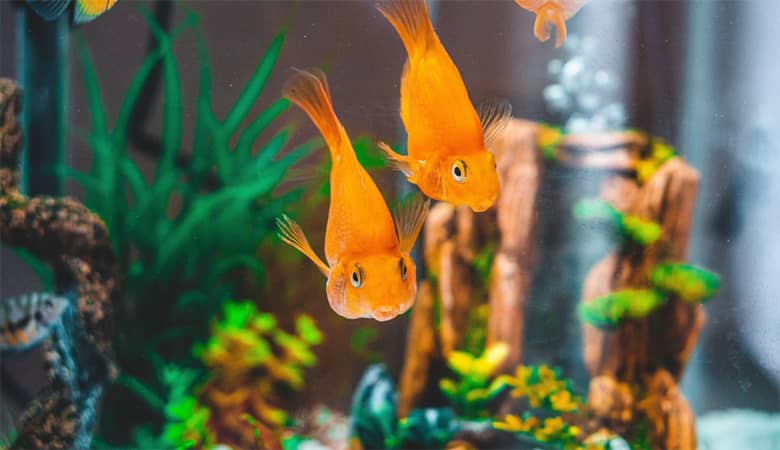Many people started revisiting traditional, home-centric hobbies during the pandemic. Some became avid bakers, others became zany plant parents, and many dove into the art and science of fishkeeping.
If your goal is to build a stunning aquarium filled with fish friends, you’re in the right place— because it’s not as easy as you think. Here are the golden rules to fishkeeping to consider before you get started.
Know Your Breeds
Breed knowledge is everything when you get started with fishkeeping. No two fish are alike, but some breeds are considered beginner-friendly while others are considered advanced. The beginner-friendly fish are low-maintenance and fairly easy to care for. The more advanced fish have nuanced needs and could be more aggressive or territorial.
For example, tetras are a small breed of schooling fish that tend to coexist well with other breeds. Conversely, the oscar fish is intelligent and beautifully colored, making it appealing to many tank owners. However, it’s aggressive, sneaky, and requires a strong water flow and lots of space to call its own, making it an advanced fish.
Researching to find fish that can cohabitate and have similar tank requirements is an important first step when starting fishkeeping. It’s also important to understand which breeds don’t do well together and how much space everyone needs to coexist.
Start Small and Scale-Up
Starting a new hobby is exciting, and watching your aquarium come to life can be incredibly rewarding. However, it’s essential to start small and scale up rather than buy a bunch of fish at once.
Taking a slow and steady approach to growing your tank will help create a safe, comfortable environment when new fish are introduced. It will also help you troubleshoot any issues and adjust your approach before adding more variables.
You should also take this advice when choosing a tank size. Start with a smaller tank and fewer fish until you get the hang of things. Once fishkeeping becomes second nature, consider an upgrade.
Invest in a Quality Tank System
While being a frugal deal shopper is fine, don’t be cheap when purchasing a tank and the supporting systems. Purchasing something high quality is a must. According to the guys over at The Aqua Advisor, if you’re buying a used fish tank, be cautious and look closely at the structural integrity. The frame and seal should be intact and undamaged. Ask the seller to fill the tank to check for signs of leaks or cracks. While a few dings and scratches are expected from a used tank, you want to ensure it won’t put your fish (or home) at risk.
Creating master research and shopping list based on what you need for your tank is also beneficial. Some purchases to consider include:
- Substrate (gravel or sand)
- Decor
- Plants
- Lights
- Thermostat
- Filter
- Pump
- Cleaning supplies (net, glass scrubber, gravel vacuum, etc.)
- Testing kit
Having a quality tank setup is non-negotiable. Expect to pay at least $200 for a basic tank, with the cost increasing with size.
Create a Consistent Cleaning Schedule
Keeping the tank clean is a must for the health and longevity of your fish. If you can’t commit to keeping a regular cleaning and maintenance schedule, fishkeeping isn’t the hobby for you.
Investing in a high-quality filter and bottom feeders (algae eaters, snails, shrimp, etc.) can help fill the gaps in your maintenance schedule. Ideally, you’ll replace approximately 30% of the water semi-monthly while removing debris in between.
When cleaning your filters, don’t use fresh water from the tap. Instead, use a bit of water from the tank so as to not disrupt healthy bacteria levels. Removing a bit of water is better than completely draining the tank for a full scrub.
Monitor Food Quality and Intake
In addition to choosing tankmates with similar eating habits, it’s also important to monitor food quality and intake. Purchase a few types of food per their breed preferences for a well-rounded diet. Avoid overfeeding your fish, removing excess food scraps soon after feeding.
Some experts recommend incorporating a weekly fasting day to prevent overeating and encourage the natural instinct to seek food. Before trying this strategy, take some time to research the specific needs of your breeds.

Monitor and Control the Temperature
While slight variations in the temperature rarely impact humans, they can be detrimental to your fish. Warmer temperatures could encourage bacteria growth or shock fish that are used to colder environments. Again, breed knowledge is essential here. Fortunately, you can get a thermostat sticker for the inside of the tank and make adjustments as needed.
Know the Signs of a Problem
Know what signs to watch for when minding your fish. For example, white spots or sores could signify fin rot or bacterial infections. Deep cleaning and antibiotic treatment can correct many of these health issues. However, you need to catch it early and isolate infected fish to prevent further issues.
Understanding what to look for will also help you find the source of the problem and maintain the health of your tank.
Know Your Limits
A big ego has no place in fishkeeping. Know your limits both as a fishkeeper and when assessing your tank size and occupancy. The task of maintaining a tank gets more challenging with size. It’s also important to avoid overstocking your tank and avoiding any fish that are outside your skillset.
It’s common to get excited about collecting fish, leading to overcrowding. Fish in an overcrowded tank may survive, but they won’t thrive. If you have territorial fish, they could become aggressive and attack their tank mates. Some fish will experience greater stress levels without sufficient room to roam, which shortens their lifespan.
Remember: start small and scale up.
Find a Supportive Community
Don’t try to navigate this experience alone. Reach out and connect with like-minded communities on social media so you can learn from the experiences of others. Work with a supplier who is knowledgeable and passionate about fishkeeping. You can also find plenty of guides online to tell you everything you need to know about different fish breeds.
Follow the golden rules of fishkeeping to build a beautiful aquarium with happy, healthy fish.

